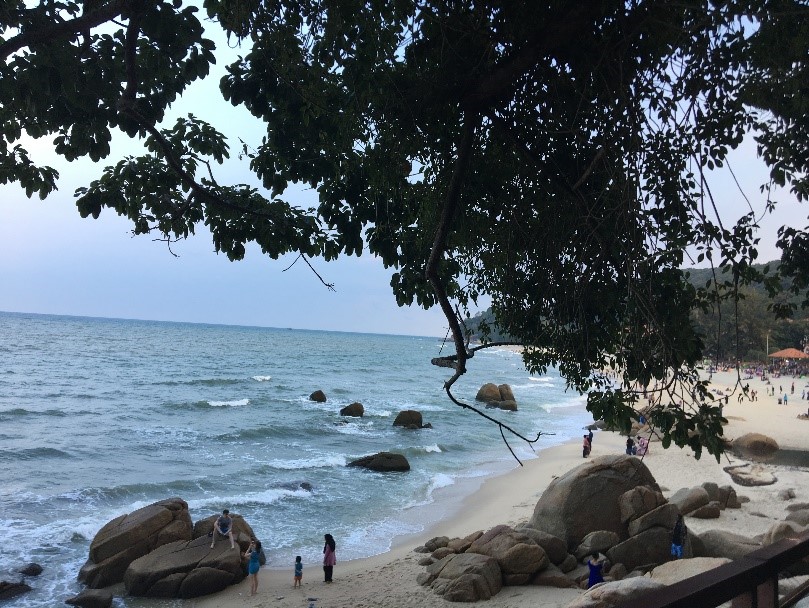
January 7, 2020, by Kelly Calladine
Tropical Medicine and Beyond Module in Malaysia
Tropical Medicine and Beyond Module in Malaysia
My name is Amasha Kottearachchi and I am a third year MPT student who undertook the Tropical Medicine and Beyond module in Malaysia last summer (following second year). I hope in writing about my experience it gives anyone thinking of applying a better understanding of what to expect and if the module would be right for them.
After receiving my acceptance into the module, although being excited, I was also initially apprehensive as this was the first year the module had been run, and going all the way to Malaysia to study is not a simple decision. However, I didn’t need to be nervous. We met everyone on the module in an information session before going to Malaysia, where we made a group chat and shared all of our flight details, finding out a lot of us would be on the same flight. Chris Walters, who was one of the module organisers, made sure we all had transportation accompanied by Malaysian students right to the registration building on campus. The rest of the module was also well organised, and we had the kindest group of students from the Malaysian campus doing the module alongside us and supporting us with anything we needed or wanted to ask. These altogether made us feel a lot more comfortable and safer throughout our time there.
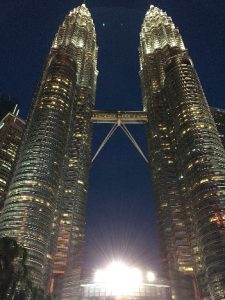
Petronas Twin Towers
Most of us arrived on the Saturday, which gave us the weekend to get settled and explore the campus and country before Monday. We all liked our accommodation, which had spacious en-suite rooms (each with AC), and a communal area, kitchen and water fountain on each floor. Despite only knowing a couple of people on the module prior to going, I quickly realised that everyone was so friendly and in a similar boat of wanting to get to know each other and travel Malaysia together. So, although being anxious about meeting mostly new people, I easily made a group of friends with students from across other courses like medicine and biology, that I would end up spending all my time with for the next couple of weeks. I think this experience helped me develop my personal confidence and ability to get to know new people in a completely new environment. Over the weekend we visited Kuala Lumpur and various malls, which were a far cry from Nottingham’s intu Victoria centre, being much bigger and more luxurious. We also visited the vibrant markets in KL, trying fresh coconuts and Durian along the way; and had returned to KL on other days to see the twin towers lit up at night or busy china town and central market. The buzzing atmosphere of KL was second to none, and being only an hour and a half away from campus on a scenic train journey allowed us to continuously explore it over our time in Malaysia.
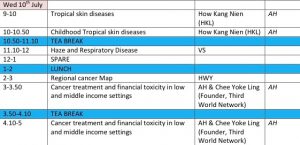
A typical day set out on our timetable
On Monday we officially started the module and were given a welcome talk and a run through our timetables. The days were packed, all being 9-5 lectures or visits. I enjoyed having such busy days (understandably necessarily to fit a whole module into just 2 weeks) but it also became quite intense and trying to fit in travelling and preparing for our assessment and exam over this time as well could get quite tiring by the end of each day.
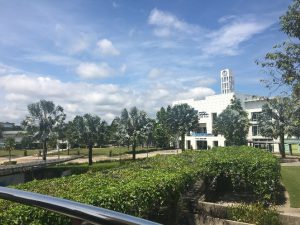
University of Nottingham Malaysia Campus
One bonus was that our lectures were just a close walk away from our accommodation, and the campus itself was beautiful. We were allowed to use the gym, outdoor pool, library, study rooms and could socialise in the Malaysian campus’ version of ‘Mooch’. There was a ‘7-eleven’ where we could buy any water or snacks, a food hall selling cheap food from all over Asia (as well as a western section), restaurants with outside seating and even a subway. If that wasn’t enough, the university surprisingly also made us 3 buffets a day between lectures – we knew we weren’t going to go hungry on this trip.
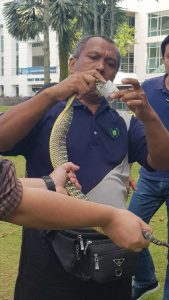
Snake Milking
What I really loved about the module itself was learning about and observing fascinating things that we would never learn about or come across in the UK, including chikungunya (a disease similar to dengue), snake venoms, Traditional Malay and Chinese Medicine, filarial disease and medicinal mushrooms. One of the most exciting things we experienced on the course was a ‘snake milking demo’, where a snake handler came onto campus with a number of vipers, pythons and even a King Cobra. He told us a bit about each snake while placing them on the grass one at a time, stopping them if they started to slither towards us (the King Cobra in this instance was especially terrifying). The handler picked up one of the snakes with just his hand, opened its jaw and proceeded to ‘milk’ its venom out of its jaws into a little container. It was amazing to watch this but also to
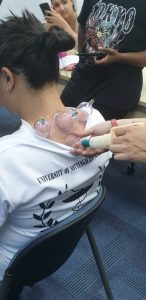
Cupping being practised on a student
learn about snake venom’s use in making antivenom, and the pathophysiology of how it affects people. Later, we were taught about snake venom’s use to treat arthritis in Ayurvedic and traditional medicine. I found it insightful learning about medicine from a whole new perspective, one very different from western medicine, during our Traditional Chinese Medicine (TCM) lecture. We learnt about their herbal remedies and techniques such as acupuncture, Gua sha and cupping, with the lecturer practicing these on the Malaysian students, and further saw TCM’s application at the Tung Shin Hospital of traditional chinese medicine (where we could get acupuncture done on ourselves). I’m grateful that we had the opportunity to gain knowledge of TCM, as we likely wouldn’t have been taught this in the UK, and can perhaps understand how to better integrate these practices (which are already growing in popularity) into western medicine to manage a patient more holistically.
As well as the Tung Shin hospital, we visited ‘Crops For the Future’, a research centre which aims to utilise underused crops for sustainable medicines, food and fishing; a private hospital; public healthcare like the ‘National Cancer Society Malaysia’ (NCSM) and botanical gardens with native plant species used in a number of medicines. These made the visit to Malaysia so much more worthwhile and unforgettable as they consolidated what we’d learned in lectures and helped us recognise what goes into the healthcare in Malaysia. The Pantai private hospital, which looked more like a luxury hotel with its marble flooring, was extremely expensive and so only accessible to the wealthy; we found out that since services like cancer screening are expensive and relatively sparse, underprivileged people can’t access these easily and often receive terminal diagnoses. This helped me fully appreciate our NHS, and also admire places like NCSM which brought at-risk people from rural areas to its centre for free screening, and provided other cheap cancer management services.
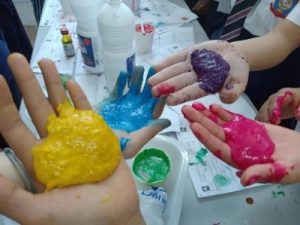
The refugee children making slime
We also visited a refugee centre, where we taught primary school refugee children (who had come to Malaysia from a number of countries) how to use microscopes and observe insects and crystals up close; we also made slime with them as a fun accompanying activity. They came to our campus the next day as well, where we did more microscope activities with younger children, and did PCR activities with 15-18-year olds. This was an incredibly humbling experience, I believe it helped me gain much greater understanding and scope of issues surrounding refugees around the world, and also developed my teaching and communication in interacting with children of varying abilities and from different countries. The children were all so keen and excited to learn, with many of them telling us about their dreams to go to university and become a doctor, scientist, lawyer or author among other professional jobs; this strongly inspired me to want to help refugees further in the future.
Our assessments were an exam and a group presentation based on socioeconomic factors and current issues (some healthcare related) in Malaysia. I really enjoyed researching deeper into more humanitarian-based problems and believe I now have a much greater awareness of current issues that may be so impactful for refugees and underprivileged people in developing countries, but are not experienced in the UK.
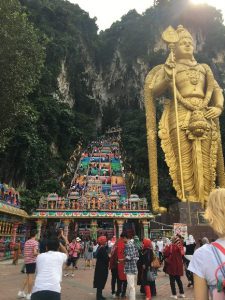
Batu Caves
Besides our curriculum, we wanted to balance as much travelling of this beautiful country as possible. I expanded my organisation, teamwork and time management skills in planning and working out how to travel to various places, and to fit in as much travelling while still retaining enough study time. I highly recommend visiting Kuala Lumpur, Batu Caves and going on a weekend trip following the first week. Many people went away that weekend to Langkawi (a touristy Malaysian island) or Singapore, and some stayed on campus to see more of Kuala Lumpur; hearing about these, they all sounded amazing. A group of us however went to an area called Kuantan on the west coast of Malaysia, which was popular with locals. Kuantan was stunning, and being able to relax on the beach and by the breath-taking Sungai Pandan Waterfall after such a packed week was definitely one of the highlights of my time in Malaysia. I would strongly advise someone doing this module to travel and immerse themselves in Malaysia’s culture as much as they can, whilst still being able to manage the workload, as it really makes studying abroad rather than in the UK worthwhile.
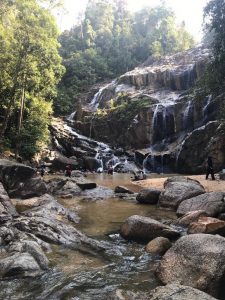
Sungai Pandan Waterfall
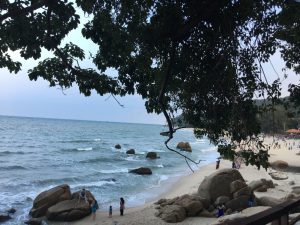
Teluk Cempedak Beach, Kuantan
Would I recommend it?
The tropical medicine and beyond module in Malaysia was a unique and unforgettable experience. It immersed us in a completely new and different environment than what we were used to, as we were living in a new country and trying to travel and delve into its culture, while making new friends and studying a packed module. This enhanced our adaptability to new situations, and improved our discipline and time management in balance our free and study time. Despite being intense at times it was certainly manageable, and even freed up time in the first term of third year. I would definitely recommend applying to this module as it was an incredible opportunity to learn and experience things that I likely never would have had I not gone, and I would consider this one of the best things I’ve done at university.
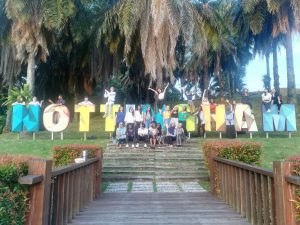
The Malaysian campus’s version of our ‘Nottingham’ sign

Hi Amasha,
This is an amazing summary of our experience of the module! Proud to see it.